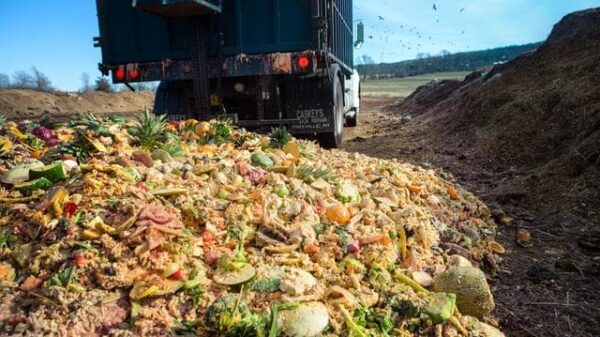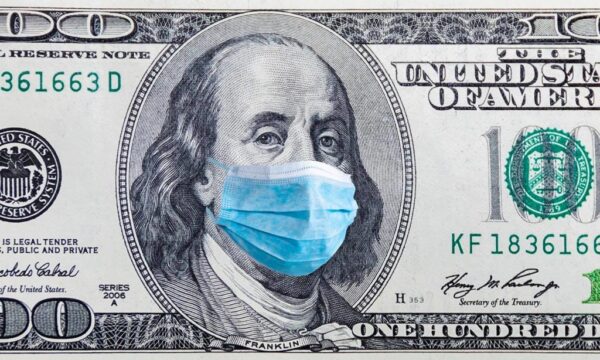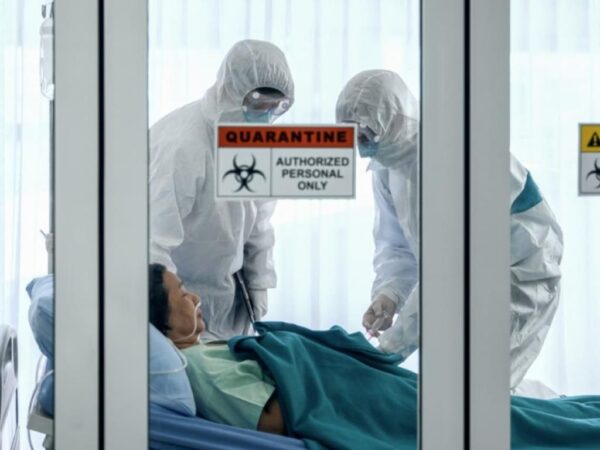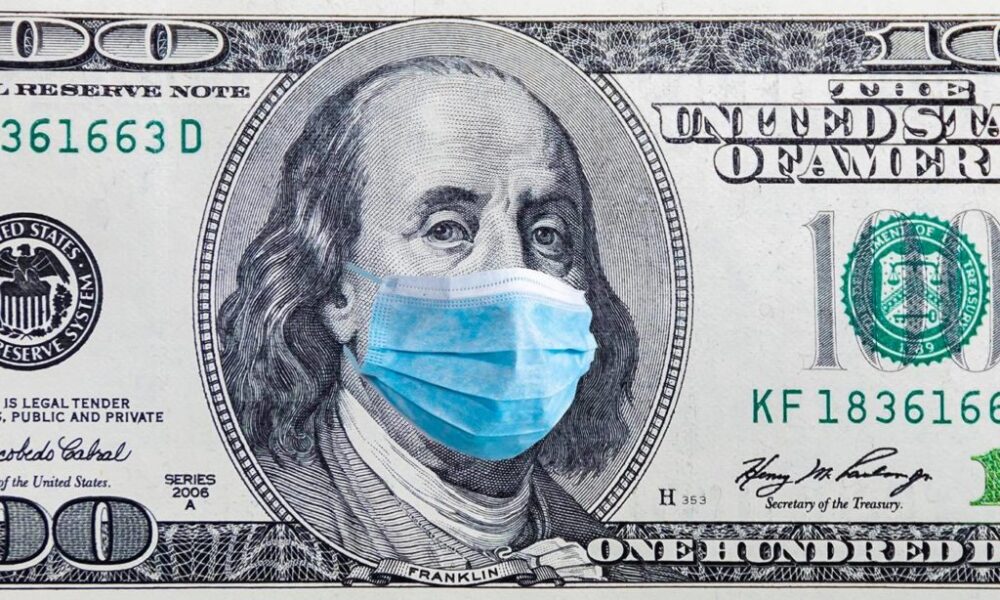Keely Mullen Socialist Alternative (ISA-the US)
Capitalism is set up like a house of cards. Disjointed supply chains, competition for component parts, research and technology hoarded – there are weak spots and vulnerabilities built into every joint in the capitalist system.
The COVID-19 pandemic, and the economic crisis which has been brewing for a decade, has caused that house of cards to collapse. Describing the breakdown in the global supply chains, The New York Times (4/10/2020) reported,
“At some ports, goods are piling up, while elsewhere container ships sail empty. Dairy farmers are dumping their milk, while grocery store shelves have been picked bare.”
Mike Jette, the vice president of consulting services at GEP – a company that provides supply chain software and strategy for major corporations like ExxonMobil and Walmart – predicts that peak disruption for big corporations with international supply chains would likely happen three months from now.
We are currently facing a potentially dangerous shortage of key goods: food, medicine, toilet paper, and certain electronics. This is not because we ran out of supplies, or because we lack the capacity to make more. It is because companies and entire industries are scrambling to reorganize supply chains that have been built around finding the cheapest possible raw materials, component parts, and labor.
Food Supply Breaking Down
In a truly dystopian illustration of this problem, there are currently mountains of food being shovelled back into the ground by wholesale producers while grocery store shelves and food banks sit empty.
According to The Guardian (4/9/2020) “Roughly half the food grown in the U.S. was previously destined for restaurants, schools, stadiums, theme parks, and cruise ships.”
There is plenty of food being grown and produced, but the nature of the demand has changed. Industrial kitchens are shuttered as large gatherings are on hold and farmers are scrambling to find customers for their excess food. The USDA did not step in to buy up excess food despite repeated pleas and now there is consensus among industry insiders that a potential food shortage is impending.
There has been no coordinated response from the federal or state governments to intervene, buy surplus crops, and distribute them to families in need, so millions of pounds of fresh food is left to rot. The myth of the invisible hand of the market is being exposed with deadly consequences.

An Alternative to Capitalist Anarchy
Illness and disease is unavoidable. Under any form of society, human beings will be susceptible to viruses and infections. (Though it is undeniable that epidemics are growing in frequency due to our constant encroachment on natural habitats.) However, what is by no means predetermined is the scale of destruction and death that sickness can cause.
The food supply issues we’ve identified above are just one example of how completely ill-equipped the capitalist system is to deal with the effects of a global pandemic.
From the drastic shortages of critical medical supplies to the millions without affordable health care or any health care coverage. From the low wages and lack of paid leave that force millions to work through sickness to the denial of needed personal protective equipment (PPE) to front-line workers as a way for bosses to cut costs.
None of these factors, which have exacerbated hundreds-fold the depth of this crisis, are inevitable. They are the result of a system designed to extend the profits of the rich at the expense of the health and safety of the rest of us.
What is needed to avoid this scale of calamity is a dramatic reorganization of society on a democratically planned basis. We need a socialist economic system where democratically elected councils of workers make the key decisions about how we invest society’s resources.
Such a society would be far better equipped to react to a crisis on the scale of this pandemic for many reasons. Here are just a few.
- Cooperation to rapidly develop needed supplies.
The shortage of PPE for U.S. health care workers has deadly consequences. The World Health Organization (WHO) has called on industry and governments to increase PPE manufacturing by 40% to meet the dire need.
General Electric workers in Lynn, Massachusetts have protested outside corporate headquarters demanding that currently idle factories be rapidly put to use making needed medical supplies.
Under a workers’ government, such a protest – or pleas from the WHO – would not be needed. Workers’ representatives, nationally and internationally, would debate and decide on the broad priorities for production and the distribution of resources based on the needs of society. Workers’ representatives in each industry, down to the enterprise level would then discuss and agree on how to implement these priorities.
Therefore – when there is a clear and proven need for ventilators or masks – factories could be rapidly retooled to make these products en masse. Multi-purpose factories could be built in order to accommodate the rapidly changing needs of society. Without profit in the mix, production can be determined by human need not the tunnel-vision greed of corporate bosses.

- The testing we need.
Despite being a global economic superpower, the U.S. has been pummelled by the COVID-19 outbreak. There are numerous reasons for this, including the Trump regime’s flippant dismissal of the impending crisis for months. Additionally, a key contributor has been the lack of available testing and the devastatingly low capacity of the U.S.’s resource-starved public healthcare system following decades of cuts. On February 10 Trump released his proposed 2021 budget which includes further cuts to SNAP, Medicaid, the CDC, as well as the U.S.’ contribution to the WHO.
On both an individual and societal level, testing is a crucial tool to limit the spread of viruses. For health care professionals, testing an individual patient allows for an accurate and quick treatment plan to be administered, including immediate isolation. It also allows for the identification of whoever that individual has had contact with – therefore far more accurately containing localized spreads of the virus. On a macro level, accurate testing information is a key component of mapping the spread, contagiousness, and general life cycle of the virus.
In the U.S., rather than using the already in-use WHO test, the Trump administration instructed the Center for Disease Control (CDC) to develop its own test. The CDC, however, is not set up to distribute and carry out mass testing in the event of a pandemic. When the CDC tests were found to be faulty, the Trump administration did not rush to find a solution. The Trump administration made a political decision to reject the WHO test, putting millions of lives at risk.
On the basis of a workers’ government and a socialist economy, where medical research and technology is in public hands, scientists from across the country – who are currently idle as labs and universities are closed – could have been deployed to develop accurate testing equipment as well as a vaccine. Tens of thousands of health care workers, alongside workers in non-essential industries, could be sent in to set up testing stations in every community. Testing could be done on a truly mass scale, an essential first step for effectively containing the spread of the virus. This would enable medical professionals to have a better sense of where there are clusters of the disease and to follow up with contact tracing. This will also require tens of thousands of workers across the country and will be pivotal in taking immediate action to limit the spread and prevent a massive second surge.
If the approach we’ve elaborated were taken, extensive lockdowns would be generally unnecessary. A socialist society would develop a democratically agreed plan for dealing with virus outbreaks, therefore preventing it from escalating to such a disastrous degree. On the basis of the chaos created by capitalism, however, lockdowns have been a necessity in most countries with a few exceptions.
- The health care we deserve.
Hospitals in many states are bursting at the seams with sick patients and health care workers are putting their lives on the line with devastatingly limited supplies of PPE.
Under a workers government, the priorities of society would be vastly reorganized. Health care would no longer be subject to the whims of billionaire executives and decisions about where to allocate resources would be made nationally with the input of workers in the industry. This would go beyond just Medicare for All – or a single-payer health care system at the point of care. It would include the public ownership of the entire health care industry – including hospitals, the pharmaceutical industry, as well as medical device companies. In such a situation it is difficult to imagine nurses wearing garbage bags or four patients being forced to share a ventilator.
If nurses and health care professionals had direct democratic input in deciding how to run our hospitals, they would not have to beg for safe staffing or basic supplies. High-quality health care would be a priority of a society whose sole purpose was to meet human need. Therefore hospitals would be given ample funding for beds, more well-trained staff, and necessary supplies and equipment. Sick people could get high-quality treatment at no cost and health care workers could do their jobs with far less fear of infection or death.

- Minimize supply chain madness.
Global supply chains are being thrown into turmoil by the coronavirus pandemic. This is not a surprise given the huge amount of redundancies and kinks in the capitalist supply chain. In a bizarre illustration of this, as we wrote in our August 2019 article “Climate Catastrophe and the Case for a Planned Economy”:
When a car is being assembled, almost every single component part will travel to Mexico, Canada, and the U.S. over and over before the parts come together to form a car. The metal base of a steering wheel that’s produced in the U.S. is sent to Mexico to get covered and stitched up before being sent back to the U.S. This is entirely so the company can find the cheapest supplies and labor to make their final product.
We do not subscribe to nationalist-based arguments about the need for products to be entirely “American-made.” It would be impossible to continue developing needed technology if component parts were solely sourced locally. For example, smartphones are full of precious metals like cobalt and lithium that can only be obtained in large enough quantities from Africa or South America.
We are by no means opposed to global trade, however it needs to be efficiently planned in the interests of people and the planet. On the basis of a planned economy, priorities for global trade would be set. If a component part can be sourced locally, it should be in order to minimize the environmental impact of global trade as well as generally making production more efficient.
In a cooperative society, supply chains would not grind to a halt because one factory halfway across the world was unable to supply one component part. This is the reality under capitalism because corporations use “just in time” methods and become reliant on the suppliers willing to provide the cheapest possible parts. Under a socialist economy, based on cooperation rather than cutthroat competition in the production process, there would be multiple suppliers that could step in to fill a need.
Fight Like Hell
If society were run in the interests of the vast majority of us, we could have contained this virus and prevented a global pandemic. We would not have been forced to work because employers were not required to provide sick leave (since the pandemic broke out, companies with less than 500 employees are required to provide two weeks sick leave) or because we do not have enough savings to miss a paycheck. We would not be left to rot with no basic safety supplies while the billionaires hide out in their compounds. We would not have to ration our food to make rent.
We need to end the rule of billionaires over our lives and their reckless drive for profit at our expense. We need to replace government in the interests of the billionaires with a government of, by and for working people where society’s resources are deployed on the basis of need. We need a society where decisions are made democratically by councils of workers internationally, nationally and within industries.
Hundreds of thousands, possibly millions, around the world will lay dead at the end of this pandemic, killed by a system that couldn’t be bothered to prioritize their lives. For them, we’ll fight for a socialist future.




